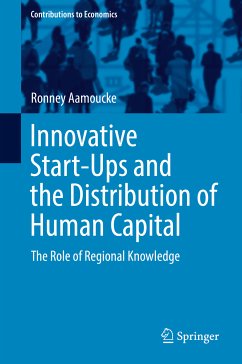This book contributes to our understanding of the reasons for the uneven geographic emergence and distribution of innovative start-ups and human capital, analyzing the role of the regional knowledge base and specifically academic knowledge. Using extensive datasets from West German regions and advanced econometric tools, it confirms a strong relationship between the presence of higher education institutions and the emergence of innovative start-ups. It also shows that the influence increases in direct relation with the innovativeness of the respective start-up, and that certain fields of knowledge are more influential than others in fostering innovative start-ups. In a second step, the multidimensional concept of quality of life is used to explain the geography of human capital across West German regions. Based on these empirical findings, the book shares valuable insights for higher education and regional development policy.
Dieser Download kann aus rechtlichen Gründen nur mit Rechnungsadresse in A, B, BG, CY, CZ, D, DK, EW, E, FIN, F, GR, HR, H, IRL, I, LT, L, LR, M, NL, PL, P, R, S, SLO, SK ausgeliefert werden.









